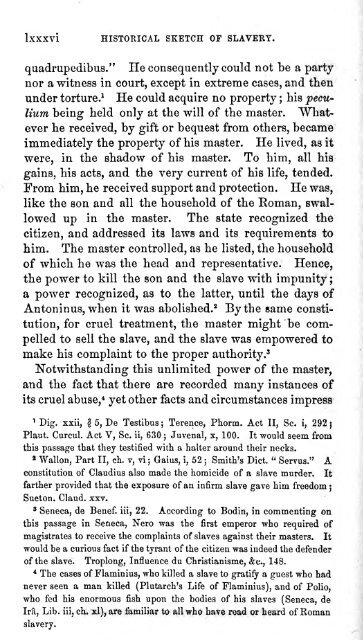Untitled - African American History
Untitled - African American History
Untitled - African American History
Create successful ePaper yourself
Turn your PDF publications into a flip-book with our unique Google optimized e-Paper software.
1XXXV1 HISTORICAL SKETCH OF SLAVERY.<br />
quadrupedibus." He consequently could not be a party<br />
nor a witness in court, except in extreme cases, and then<br />
under torture. 1 He could acquire no property ; his peculium<br />
being held only at the will of the master. Whatever<br />
he received, by gift or bequest from others, became<br />
immediately the property of his master. He lived,<br />
as it<br />
all his<br />
were, in the shadow of his master. To him,<br />
gains, his acts, and the very current of his life, tended.<br />
From him, he received support and protection. He was,<br />
like the son and all the household of the Roman, swal-<br />
lowed up in the master. The state recognized the<br />
citizen, and addressed its laws and its requirements to<br />
him. The master controlled, as he listed, the household<br />
of which he was the head and representative. Hence,<br />
the power to kill the son and the slave with impunity ;<br />
a power recognized, as to the latter, until the days of<br />
Antoninus, when it was abolished. 2<br />
By the same constitution,<br />
for cruel treatment, the master might be com-<br />
pelled to sell the slave, and the slave was empowered to<br />
make his complaint to the proper authority. 3<br />
Notwithstanding this unlimited power of the master,<br />
and the fact that there are recorded many instances of<br />
its cruel abuse, 4<br />
yet other facts and circumstances impress<br />
1<br />
Dig. xxii, 5, De Testibus ; Terence, Phorm. Act II, Sc. i, 292 ;<br />
Plaut. Curcul. Act V, Sc. ii, 630 ; Juvenal, x, 100. It would seem from<br />
this passage that they testified with a halter around their necks.<br />
2 Wallon, Part II, ch. v, vi ; Gaius, i, 52 ; Smith's Diet. " Servus." A<br />
constitution of Claudius also made the homicide of a slave murder. It<br />
farther provided that the exposure of an infirm slave gave him freedom ;<br />
Sueton. Claud, xxv.<br />
3 Seneca, de Benef. iii, 22. According to Bodin, in commenting on<br />
this passage in Seneca, Nero was the first emperor who required of<br />
magistrates to receive the complaints of slaves against their masters. It<br />
would be a curious fact if the tyrant of the citizen was indeed the defender<br />
of the slave. Troplong, Influence du Christianisme, &c., 148.<br />
4 The cases of Flaminius, who killed a slave to gratify a guest who had<br />
never seen a man killed (Plutarch's Life of Flaminius), and of Polio,<br />
who fed his enormous fish upon the bodies of his slaves (Seneca, de<br />
Ir&, Lib. iii, ch. xl), are familiar to all who have read or heard of Roman<br />
slavery.


